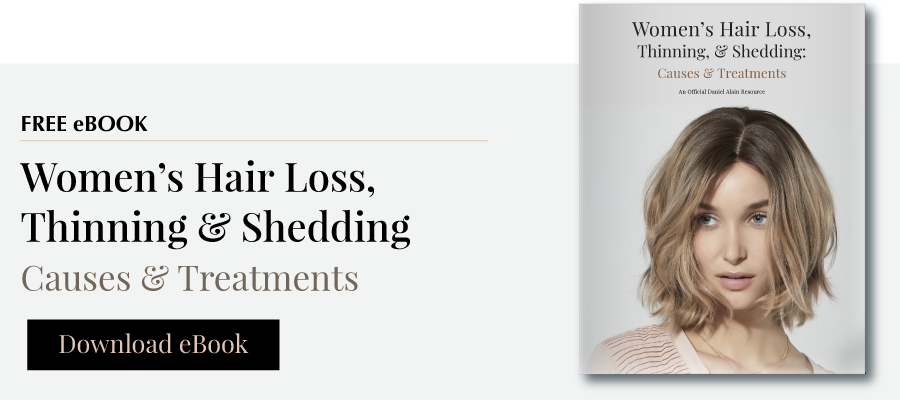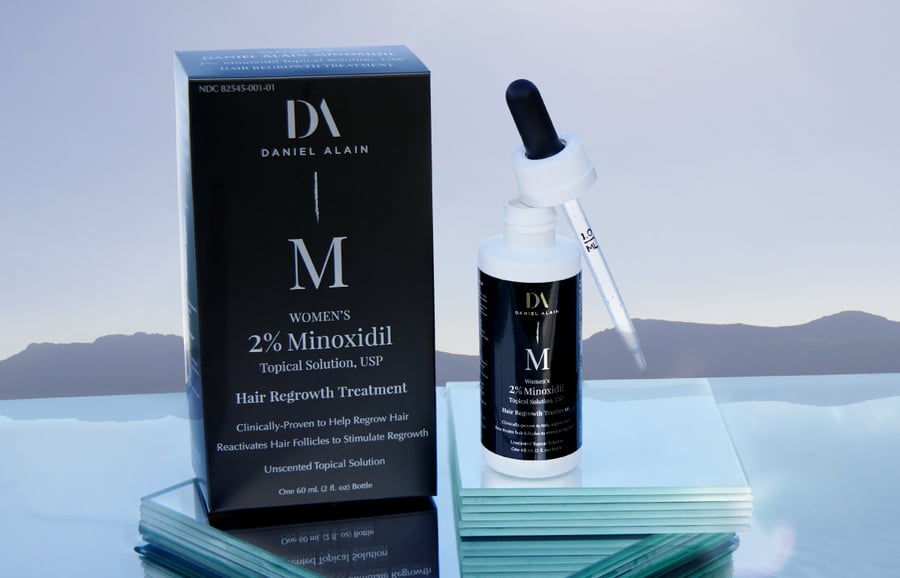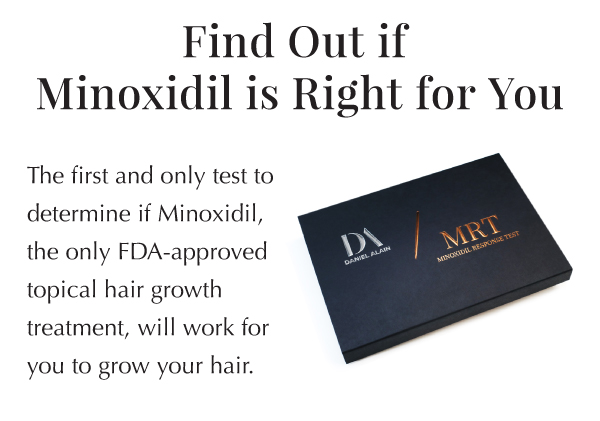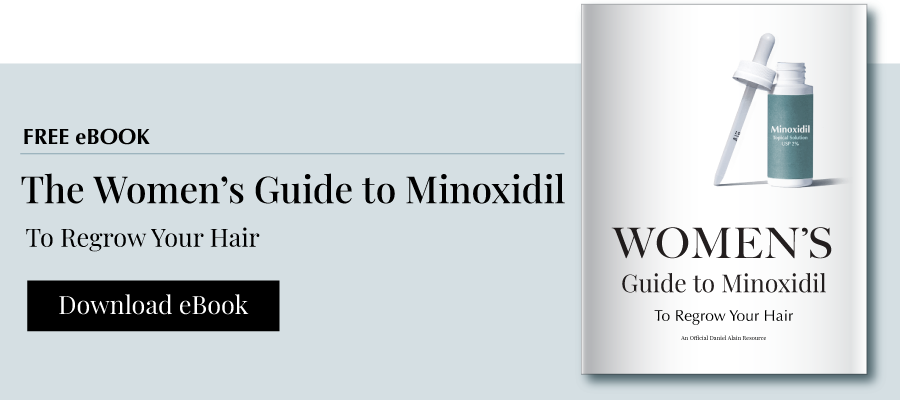Can COVID-19 Cause Hair Loss?
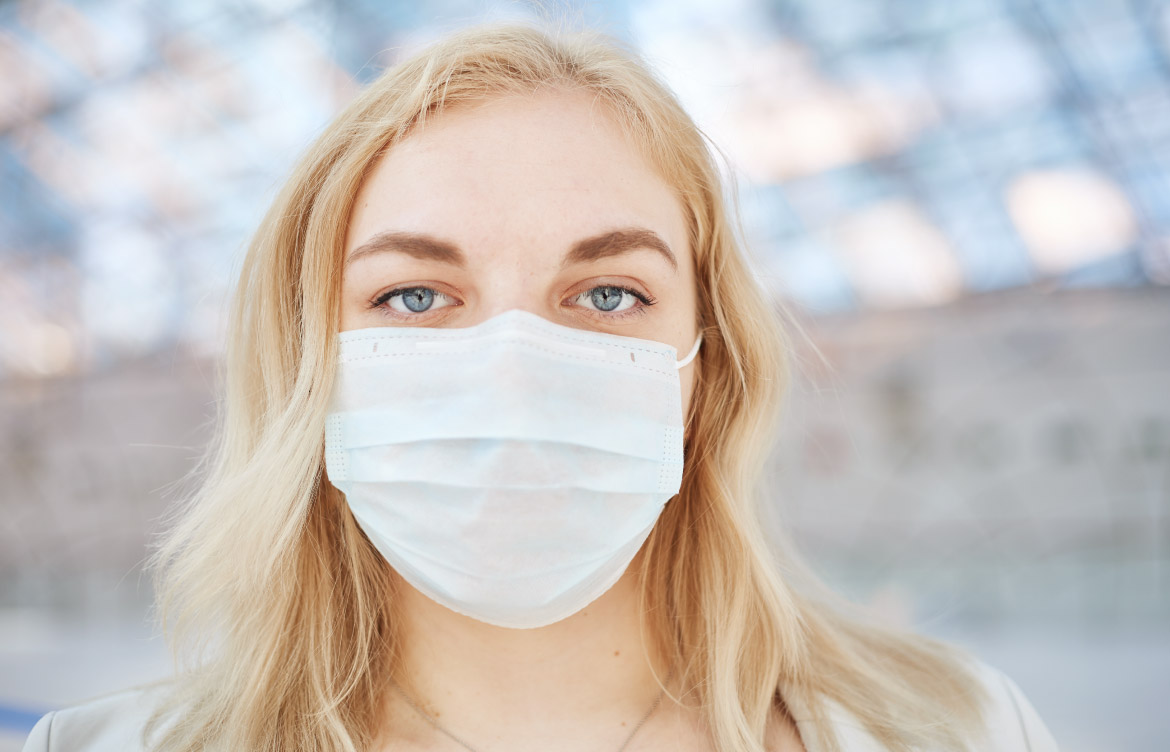
Yes, COVID-19 can cause hair loss — a shocking reality for many people. Why? Well, it’s not exactly advertised. This ostensible secrecy causes many men and women to suffer with hair loss in silence, as though COVID’s flu-like symptoms weren’t bad enough. But does COVID cause hair loss for everyone? Not exactly.
We’re here to share the truth about COVID causing hair loss and help you figure out ways to mitigate it if you’ve been affected. Daniel Alain is a world-renowned leader in hair loss solutions, and we fiercely advocate for an open dialogue about hair loss.
If you’re suffering from hair thinning or shedding from COVID, you have options like our anti-hair shedding treatment INTACT, Minoxidil 2 % for women or 5% for men, and 100% European human hair wigs.
So, does COVID cause hair loss? We know the answer is yes… but let’s find out why.
WHY DOES COVID CAUSE EXCESSIVE HAIR SHEDDING?
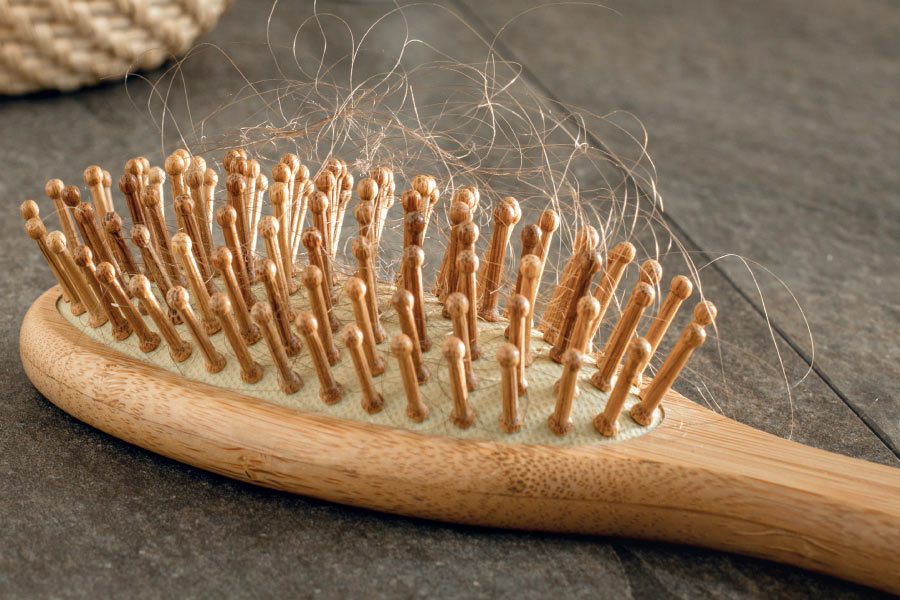
Hair loss isn’t a surprising symptom for other illnesses (usually autoimmune diseases) like lupus, Hashimoto’s, and thyroid disorders. Additionally, many medications cite hair loss as a side effect, including Parkinson’s treatments.
But COVID-19 isn’t considered an autoimmune disease, in which case your immune system would mistakenly attack healthy hair follicles to combat illness. However, COVID causes hair loss in a couple of different ways:
Stress
Telogen effluvium, or stress-related hair loss, is the most common COVID hair loss cause. With this issue, your body becomes so stressed out that it affects your hair growth cycle. Usually, stress-related hair loss lasts for six months or until the person removes the stressor causing it. This could result from high-stress work environments, family conflict, pregnancy, surgery, trauma, nutritional deficiencies, or unattended mental health problems.
One study published in the Irish Medical Journal of Science examined 39 COVID-19 patients over a few months. Every single participant experienced hair loss, specifically acute telogen effluvium, within 2-3 months of contracting COVID. The kicker? 92.3% of the participants were women.
Another study at the Rohani Hospital in Pakistan examined 198 COVID patients. The researchers found that just over 24% of patients experienced hair loss. The kicker? Participants consisted of men and women almost equally.
You might wonder: does COVID cause hair loss for women more than men? This might seem plausible considering women experienced greater psychological distress during the pandemic, according to one study. Still, all the studies cited mention the lack of extensive research into the topic, so it’s best not to blanket hair loss qualifiers here.
The good news? Stress-related hair loss subsides within a few months. However, some cases, particularly patients with “long” COVID, can see hair loss lasting for a few years.
Triggered autoimmune disease
Some studies show a growing onset of autoimmune diseases following COVID-19 diagnoses, as the virus affects some people’s immune system functioning. While research is still fresh on this topic, many experts and patients confirm hair loss as a side effect of certain autoimmune diseases.
Can the COVID Vaccine Cause Hair Loss?
The COVID vaccine also has commonly known side effects such as a sore arm, loss of appetite, and swollen lymph nodes. However, hair loss isn’t as frequently discussed or even noticed as an offshoot of the vaccine.
So does COVID cause hair loss through the vaccine?
The vaccine is known to have caused hair loss in a very small group of people.
The Vaccine Adverse Event Reporting System (VAERS) shows 1,984 alopecia reports from the COVID-19 vaccine.
Still, most medical experts caution against haphazardly attributing hair loss to every patient’s vaccination status. Since the vaccine is new, more research is needed to establish how strong the connection is.
Hair loss from COVID and the vaccine? Before we wallow in these unsettling findings, let’s explore some hair loss solutions you can use right now to mitigate your COVID hair loss.
HOW TO FIX COVID-RELATED HAIR LOSS
If you’ve read up on hair loss solutions, you’ve probably come across two common ones: Minoxidil and wigs. On top of that, you might consider an anti-hair shedding treatment to lock in your existing strands and prevent further thinning or hair loss.
Remember, most COVID hair loss is stress-related hair loss, which means it can subside on its own. Most telogen effluvium patients recover within a few months, with some cases lasting a couple of years — but that’s not the norm.
Still, a few months of hair loss are enough to drain your confidence and zest for life. We get it. Let’s explore both short-term and long-term solutions.
Use INTACT Anti-Hair Shedding Treatment

There is a temporary nature to stress-related hair loss, which means you may want to start by focusing on retaining your existing strands. Daniel Alain’s proprietary INTACT anti-hair shedding treatment is a hair retention solution that helps you stop further shedding during follicle-intensive activities such as washing or brushing your hair.
We developed the product’s patented Pililock® Sevilla Orange Complex within five years in our state-of-the-art CLIA-certified lab. Dermatologists and hair experts oversaw the entire process, meticulously fine tuning the formula until it was perfect. Then, we published it for peer-review in medical journals.
The consensus? INTACT stops shedding in its tracks, and it’s clinically proven to do so.
Here’s how it works:
You apply the solution to your scalp, right at the root of your hair follicles. In the next 30 minutes, INTACT will grip your hair strands and constrict your follicular muscles to keep every hair in place. This occurs even during the highest-shedding activities like styling and showering.
Furthermore, the constriction will give your hair strands a little boost. Hello volume! No more shedding and a volume boost? Sign us up!
Remember, INTACT is a retention solution. It won’t regrow your lost locks; however, it’s a fantastic hair loss mitigator for the few months your scalp needs to overcome the telogen effluvium caused by COVID-19.
Plan B?
Regrow Your Hair with Minoxidil
Minoxidil is one of the two FDA-approved drugs for hair loss, specifically androgenetic alopecia. Minoxidil vaso-dilates, which means it dilates the blood vessels in your scalp and allows for better oxygen and nutrient flow. Initially a hypertension treatment, doctors investigated further when they noticed hair regrowth as a side effect of the drug in early trials.
Minoxidil responders experience greater hair density upon a few months of treatment, both in diameter and the number of hairs.
The thing with Minoxidil is that it doesn’t work for everyone — and even when it does work, it takes months to show results.
Brand-name carriers like Rogaine® tout widespread effectiveness, but it only works for about 30-40% of women and 50% of men.
For a while, Minoxidil was like a game of Russian Roulette. We saw thousands of clients take a chance, hoping to see results within the first few months. The waiting game is hard enough for those that see results, but it’s downright devastating to wait nine months to one year without any results.
Our team of dermatologists discovered the common denominator of Minoxidil responders: SULT1A1 enzyme activity. Without it, patients would never respond to Minoxidil.
Not everyone has these necessary enzymes in their scalp’s ecosystem, which explains why not everyone responds to Minoxidil. So then, are you out of luck? On the contrary!
Why You Should Take a Minoxidil Response Test First

If you have androgenetic alopecia (genetic hair loss), you should complete these two steps before starting treatment:
- Take Daniel Alain’s Minoxidil Response Test (MRT) to see if you have the SULT1A1 enzyme activity necessary to respond to Minoxidil. Daniel Alain’s MRT helps you know whether your hair will respond to Minoxidil within two weeks. Order and register your kit today!
- If you’re not a responder, start using Daniel Alain’s Regrowth System to boost SULT1A1 enzyme activity and give your scalp the necessary enzyme activity to activate Minoxidil.
These two steps are the best route to seeing results with Minoxidil.
Keep in mind that COVID hair loss is usually telogen effluvium, which is stress-related hair loss. This hair loss cause might not subside with Minoxidil because the stressor might still be present, whether it’s COVID or another physical or emotional stressor.
And remember to chat with your doctor before trying Minoxidil, no matter what your hair loss cause is.
Wear a Human Hair Wig or Topper

Wigs are proven to improve self-esteem in women suffering from hair loss. Plus, it’s an immediate solution offering style and ample coverage.
But we’ll add one more criterion to this ideal solution: choose a wig with high-quality materials and proven craft expertise. Daniel Alain has thirty years of experience creating the world’s most luxurious, 100% human hair wigs. Our founder scouted the world’s most silky, soft, and strong hair when traveling through Eastern Europe, sourcing quality Remy hair for our extensive private reserve of European hair.
With these precious materials, he employed the world’s most skilled wig artisans to hand-tie each wig. The result is our premium Follea wig collection, featuring luxury wigs with flawless bounce, silky-smooth texture, and impeccable shine. You have incredible variety with wigs, from red-toned cinnamon to deep, rich espresso hues.
While you explore other hair loss solutions, an oh-so-gorgeous 100% European human hair wig will give you the confidence to resume your daily life and feel empowered with every step.
FIND A TREATMENT FOR COVID HAIR LOSS AT DANIEL ALAIN
So, does COVID cause hair loss? Unfortunately, the answer is yes for many struggling with the illness. However, COVID hair loss is usually stress-related — meaning it’s only temporary in most cases.
But the few months in between can feel limiting.
Dinner out with friends? One too many checks in the mirror could dampen your mood. Work meeting? Thinning might take away your charisma and wit. But not if you reclaim control of your hair with a clinically proven hair loss solution. COVID causes hair loss and despair for many — but you can overcome it with the right knowledge, awareness, and clinically proven hair loss solutions.
It’s time to feel confident about your hair again. We can help — contact one of our expert stylists for a consultation.
book a free consultation
Our stylists will help you find the right hair loss solution just for you.

JOIN OUR COMMUNITY
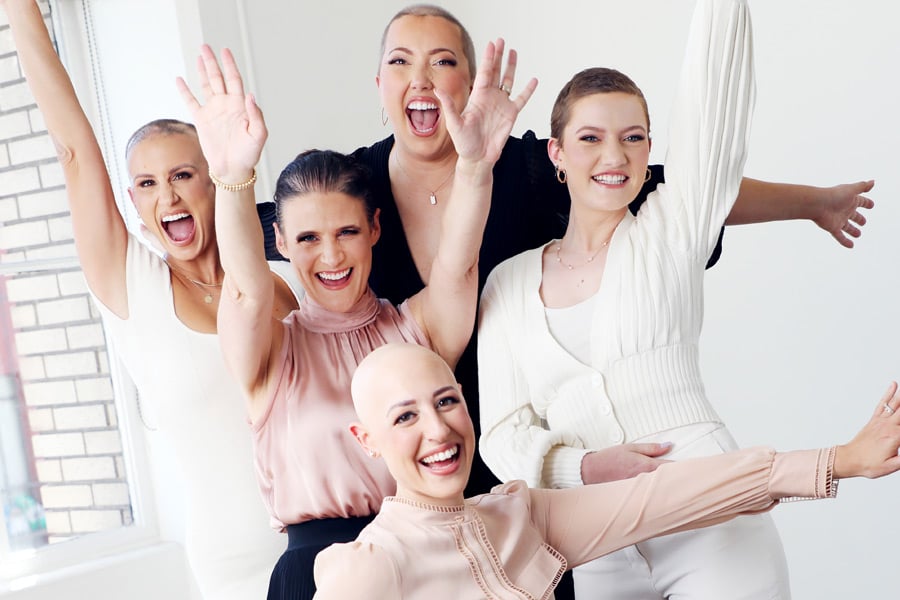
Need more resources? We’ve got you covered. Learn more about COVID hair loss in our FAQs below, or head over to our hair loss Learning Center for further resources.
- Check out our hair loss videos here.
- Read reviews from real customers here.
- Read customer journeys here.
Frequently Asked Questions
Will COVID Hair Loss Go Away on its Own?
COVID hair loss will likely go away on its own. Stress-related hair loss is the most common COVID hair loss type, which subsides within a few months. The idea is to remove the stressor so your hair growth cycle can resume its natural course.
However, sometimes people experience “long” COVID, which will naturally lengthen telogen effluvium. In these cases, COVID hair loss could last as long as a couple of years.
How Long Does COVID Hair Loss Last?
Most cases of COVID hair loss last between three to six months. In “long” COVID cases, hair loss could last up to a couple of years.
Does Everyone Experience Hair Shedding When Contracting COVID-19?
No, but it’s hard to know exactly how many people actually experience COVID hair loss. We don’t have years and years of medical studies to reference. Plus, COVID affected such a massive number of people that exponentially outnumbers the participants examined thus far.
Overall, studies are all over the place. One study cites a 24% prevalence of hair loss in participants with COVID. Another cites 100% of participants experiencing hair loss, with the latter study affecting a much larger subset of women than the former.
Can COVID Hair Loss Be Permanent?
While studies aren’t conclusive, it’s rare for COVID hair loss to be permanent.
What is the Best Way to Treat COVID Hair Shedding?
You can treat COVID hair shedding with INTACT, an anti-hair shedding treatment that locks your hair in at the root.
What if My Shedding Has Progressed to Full-on Hair Loss?
You’re not alone, and you still have options. You might consider trying Minoxidil if your hair loss cause is genetic. Alternatively, you might embrace a 100% European human hair wig from Daniel Alain.
Is There a Way to Immediately Stop Hair Shedding From COVID?
The fastest way to immediately stop COVID hair loss is with INTACT. Our anti-hair shedding treatment works within 30 minutes and shows results after just one use.
Is INTACT Safe to Use on My Hair?
Absolutely. INTACT is a safe, clinically proven formula to retain hair. We don’t add parabens, silicones, dyes, SD-alcohol, or mineral oil. Plus, it’s safe for vegans and people with colored hair.
Does INTACT Regrow Hair?
INTACT doesn’t regrow hair. Instead, it focuses on retaining existing hairs with its clinically proven Pililock® Sevilla Orange Complex.The formula constricts follicular muscles for each hair strand, locking each hair in place even when you shower or style your hair.
Does Minoxidil Really Work to Regrow Hair?
Yes, Minoxidil is an FDA-approved solution for hair loss. It works for about 30-40% of women and 50% of men. It certainly regrows hair, but only if you have the necessary SULT1A1 enzyme activity.
Does Minoxidil Work for Everyone?
No, Minoxidil only works for people with the SULT1A1 enzyme activity required to activate Minoxidil’s active component. It works for about 30-40% of women and 50% of men.
How Does a Minoxidil Response Test Work?
The Minoxidil Response Test is a seamless way to find out if you have the necessary scalp enzyme activity to activate Minoxidil’s active ingredient. All you have to do is order and register a kit, pluck out a few hair strands, and mail them to our CLIA-certified lab. Within one week (two weeks max), we’ll let you know if your hair will respond to Minoxidil.


